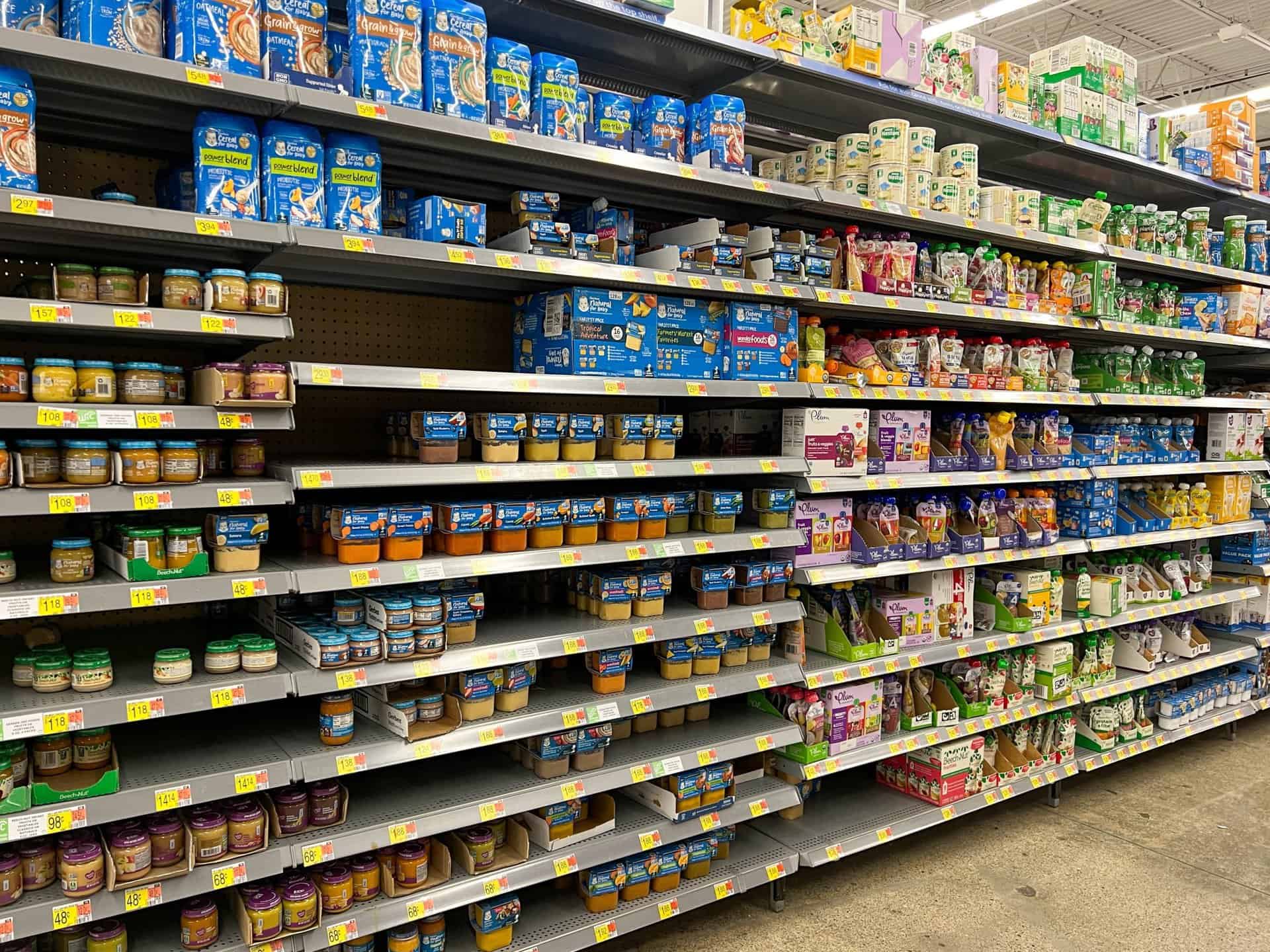Heavy Metals in Baby Food: FDA Actions and Investigations
- Last Updated: June 12th, 2025

Attorney Jessica Paluch-Hoerman, founder of TruLaw, has over 28 years of experience as a personal injury and mass tort attorney, and previously worked as an international tax attorney at Deloitte. Jessie collaborates with attorneys nationwide — enabling her to share reliable, up-to-date legal information with our readers.
Legally Reviewed
This article has been written and reviewed for legal accuracy and clarity by the team of writers and legal experts at TruLaw and is as accurate as possible. This content should not be taken as legal advice from an attorney. If you would like to learn more about our owner and experienced injury lawyer, Jessie Paluch, you can do so here.
Fact-Checked
TruLaw does everything possible to make sure the information in this article is up to date and accurate. If you need specific legal advice about your case, contact us by using the chat on the bottom of this page. This article should not be taken as advice from an attorney.
Key takeaways:
- Many popular baby foods, especially rice-based snacks, cereals, and teething biscuits, contain high levels of inorganic arsenic, lead, cadmium, and mercury that can harm brain development.
- A Congressional report found that 95% of tested baby foods contained toxic metals, prompting an FDA investigation and new guidelines to limit heavy metal contamination in the industry.
- Parents can reduce babies' exposure by choosing rice-free foods, limiting juice, offering a variety of fruits and veggies, and making some baby food at home with organic ingredients.
Overview of Heavy Metals in Baby Food
On this page, we’ll provide an overview of the heavy metals in baby food lawsuit, health risks of toxic metal exposure for infants, the FDA’s investigation into heavy metal contamination in baby food, and much more.
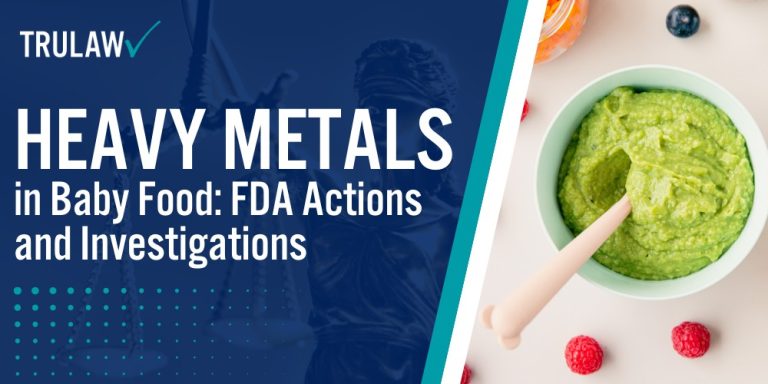
Intro to Heavy Metals in Baby Food
Key details of heavy metals in baby food include:
- Many popular baby foods, especially rice-based snacks, cereals, and teething biscuits, contain high levels of inorganic arsenic, lead, cadmium, and mercury that can harm brain development.
- A Congressional report found that 95% of tested baby foods contained toxic metals, prompting an FDA investigation and new guidelines to limit heavy metal contamination in the industry.
- Numerous class action and individual toxic baby food lawsuits have been filed against major manufacturers for failing to disclose or reduce the contamination.
If your child regularly consumes baby foods high in heavy metals and develops autism, ADHD, or other neurodevelopmental issues, you may be eligible for compensation.
Contact TruLaw using the chat on this page to receive an instant case evaluation and determine if you qualify to join others in filing a toxic baby food lawsuit today.
Table of Contents
Health Risks of Heavy Metal Exposure for Infants
Parents may wonder if homemade baby food is a safer alternative to store-bought options when it comes to heavy metal contamination.
While making your own baby food allows you to control the ingredients, it doesn’t necessarily eliminate the risk.
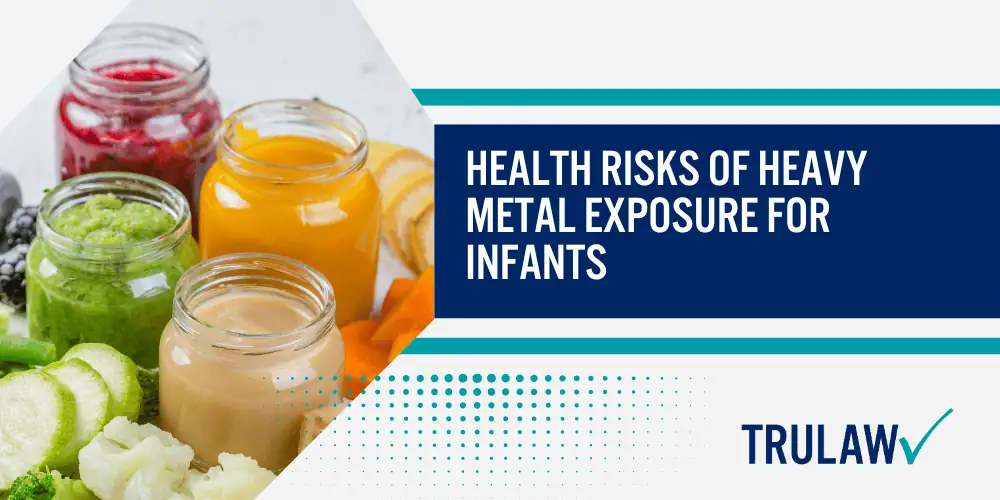
Many foods that are common in homemade baby food, such as rice, sweet potatoes, and certain fruits and vegetables, can still contain heavy metals absorbed from the soil.
The key is to use a variety of ingredients and limit those that tend to be higher in contaminants.
Developmental & Neurological Issues from Heavy Metals
Exposure to toxic heavy metals like arsenic, lead, cadmium, and mercury poses serious health risks for babies and young children.
These metals can harm a child’s developing brain and nervous system, potentially causing permanent loss of intellectual capacity, behavioral problems, attention-deficit disorders, and other long-term neurodevelopmental issues.
Infants are especially vulnerable to the harmful neurological effects of these toxic metals, as their brains and organ systems are rapidly developing.
They also absorb more of the heavy metals they ingest compared to adults.
Other Health Concerns Linked to Toxic Metals in Food
Regularly consuming even low levels of these contaminants over time can increase the risk of lifelong deficits and health problems.
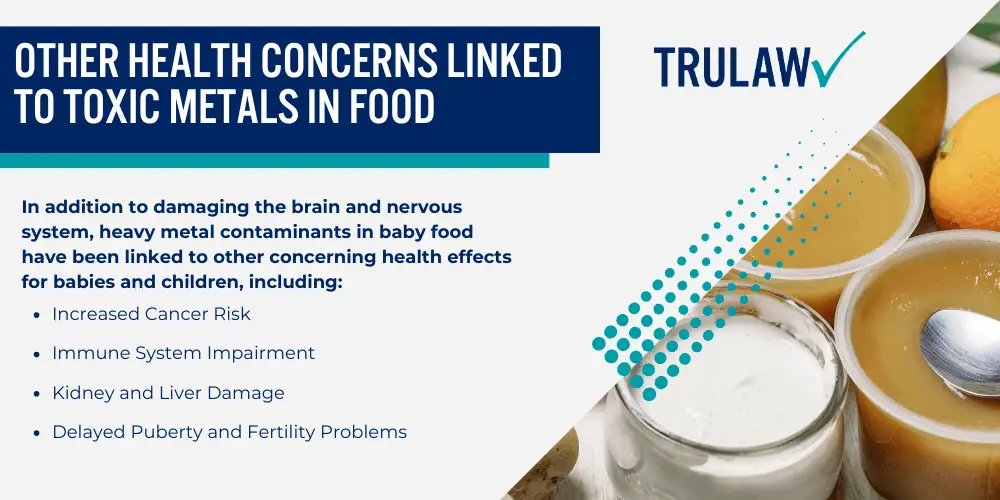
In addition to damaging the brain and nervous system, heavy metal contaminants in baby food have been linked to other concerning health effects for babies and children, including:
- Increased Cancer Risk: Certain heavy metals like arsenic, cadmium, and lead are known or probable human carcinogens that can increase cancer risk over time.
- Immune System Impairment: Heavy metal exposure may weaken a child’s immune system, making them more susceptible to infections and disease.
- Kidney and Liver Damage: Exposure to metals like cadmium and mercury can harm the kidneys and liver, interfering with proper growth and development.
- Delayed Puberty and Fertility Problems: Some studies link heavy metals to hormone disruption that may delay puberty and impact fertility later in life.
Babies are most often exposed to unsafe levels of heavy metals through contaminated water and food, including infant formula and baby food products.
Rice-based foods like infant rice cereal tend to be particularly high in inorganic arsenic.
FDA Investigation of Baby Food Metal Contamination
While organic baby food may have lower levels of certain pesticides, it can still contain similar levels of heavy metals compared to conventional products.
Toxic metals are found in soil both naturally and from pollution, so organic crops uptake these contaminants in the same way as conventionally grown ingredients.
The FDA and baby food manufacturers are working to implement changes across the industry to lower metal levels in all types of baby food.
Congressional Report Uncovers Heavy Metals in Food
In February 2021, a U.S. House of Representatives subcommittee released a report revealing concerning levels of heavy metals in commercial baby foods.
The Subcommittee on Economic and Consumer Policy requested internal documents and test results from seven of the largest U.S. baby food manufacturers.
Four of the companies – Nurture (HappyBABY), Beech-Nut, Hain Celestial (Earth’s Best) and Gerber – responded with lab testing data.
The results showed heavy metals present in many of their finished products and ingredients:
- 95% of baby foods tested contained lead
- 73% contained arsenic
- 75% contained cadmium
- 32% contained mercury
Some foods, including many rice-based snacks and cereals contain very high amounts of heavy metals.
Several exceeded the FDA’s maximum allowable levels for toxic metals in bottled water and other foods.
FDA’s Testing & Analysis of Baby Food Metal Levels
The congressional report prompted the FDA to conduct its own testing and investigation of toxic metal levels in infant and toddler foods.
The FDA evaluated 288 samples of baby foods and ingredients across many food types and brands, testing for four heavy metals: lead, cadmium, arsenic, and mercury.
The analysis also included many other toxic elements like chromium and nickel.
The results aligned with the subcommittee’s findings – many baby foods and ingredients contained concerning levels of toxic metals, with rice-based foods having some of the highest amounts:
- 76% of infant rice cereals exceeded the FDA’s 100 ppb limit for inorganic arsenic in infant rice cereal.
- 53% of baby food sweet potato samples and 29% of teething biscuits/cookies had more lead than the FDA’s recommended 10 ppb limit for drinking water.
- 34% of infant formula samples contained cadmium above the EPA’s 5 ppb limit for drinking water.
The FDA affirmed there are no safe levels of heavy metals in foods for babies and toddlers.
FDA Actions to Reduce Baby Food Metal Contamination
Based on the testing results, the FDA is taking several steps to help reduce heavy metal levels in both store-bought and homemade baby foods.
This includes providing guidance to the industry on cooking rice to lower arsenic levels, as well as sourcing and manufacturing best practices to reduce metals.
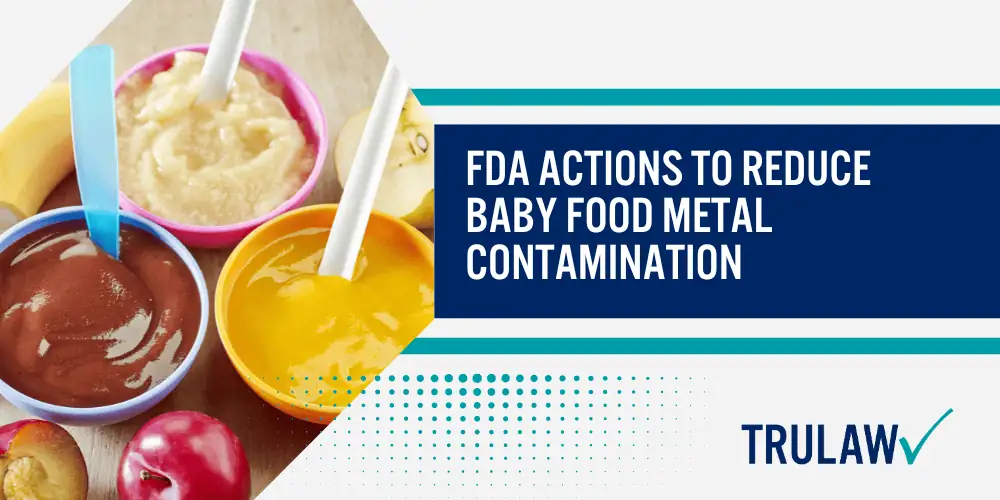
The FDA is also considering establishing legally enforceable limits for heavy metals in all baby foods rather than just providing guidance and recommendations.
New FDA Guidance & Limits on Heavy Metals in Food
Recent concerns have prompted the FDA to intensify its efforts to address the presence of heavy metals in food.
This initiative aims to safeguard the health of babies and young children from the potential risks posed by toxic metals.
The FDA is taking several steps to help reduce heavy metal levels in foods for babies and young children:
- Finalizing guidance for inorganic arsenic in infant rice cereal and apple juice. Rice cereals should have no more than 100 ppb of inorganic arsenic, and apple juice should have no more than 10 ppb.
- Consider establishing legally enforceable maximum limits for heavy metals across all baby foods, not just guidance and recommendations.
- Increasing inspections and testing of baby food manufacturers for compliance with current and upcoming guidance/limits.
- Providing guidance to industry on sourcing and manufacturing best practices to lower metals.
The FDA is encouraging baby food manufacturers to adopt these practices as quickly as possible to reduce toxic metal levels in their products.
However, many of these actions will take time to implement.
Ongoing FDA Monitoring of Baby Food Metal Levels
The FDA plans to continue monitoring baby food contamination with toxic metals through their annual sampling assignment and Total Diet Study.
They will also work with manufacturers to support their efforts to lower heavy metals in their raw ingredients and products.
As newer, better manufacturing practices take effect across the industry, the FDA expects to see reductions in metal content in baby foods over time.
They plan to evaluate progress and make adjustments to limits and regulations as needed.
Lawsuits Over Heavy Metals in Baby Food Products
Since the report revealed unsafe levels of heavy metals in many popular baby food products, lawsuits have been filed against the manufacturers.
These include toxic baby food lawsuits alleging the companies failed to disclose or reduce the contamination, as well as individual cases involving children who regularly consumed the foods and developed health issues.
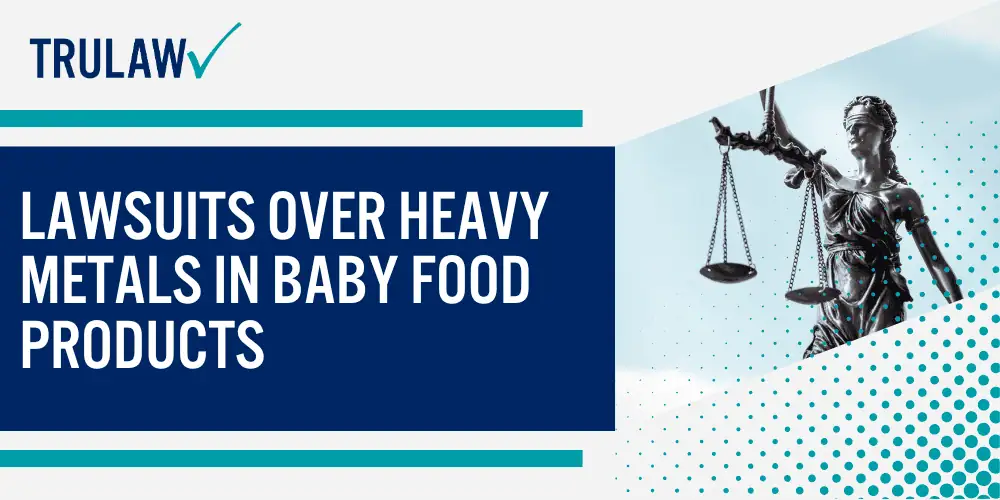
Plaintiffs claim the toxic metal exposure from both store-bought and homemade baby foods contributed to the problems.
Class Action & Individual Lawsuits Against Makers
Since the congressional subcommittee report revealed the presence of unsafe heavy metals in many popular baby food products, numerous toxic baby food lawsuits have been filed against the biggest baby food manufacturers.
The lawsuits allege the companies knew their baby foods contained dangerous levels of toxic metals but failed to disclose this to consumers or take action to reduce the metals.
Plaintiffs claim the manufacturers deceptively marketed their products as healthy and safe for babies despite the contamination.
In addition to the class actions, some parents are filing individual lawsuits against baby food makers.
These cases involve babies and toddlers who regularly ate the contaminated baby foods and developed autism spectrum disorders, ADHD, and other neurodevelopmental problems and health issues.
Legal Basis & Allegations in Baby Food Lawsuits
Plaintiffs are seeking damages for medical expenses, ongoing care needs, lost wages, pain and suffering, and more.
The baby food lawsuits make several legal claims against the manufacturers including, but not limited to:
- Deceptive advertising and labeling of products as safe and healthy
- Failure to warn consumers of risks from toxic metal contamination
- Breach of warranty and implied promises about product safety
- Negligence in manufacturing practices and quality control measures
- Unjust enrichment from knowingly selling contaminated products
Plaintiffs are seeking damages for medical expenses, ongoing care costs, pain and suffering, lost wages if parents had to quit jobs to care for their child, and punitive damages.
Some suits also demand that baby food makers take steps to ensure safer products, such as implementing better testing, shifting growing and processing methods, changing ingredients, and other practices to reduce heavy metals.
The litigation is still in the early stages.
Many cases will likely be consolidated into multidistrict litigation (MDLs) for more efficient proceedings.
If any of the lawsuits succeed, the courts could award significant damages and mandate stricter safety practices by baby food manufacturers.
What Parents Can Do About Heavy Metals in Baby Food
Making smart choices about store-bought foods and ingredients for homemade baby food can make a difference.
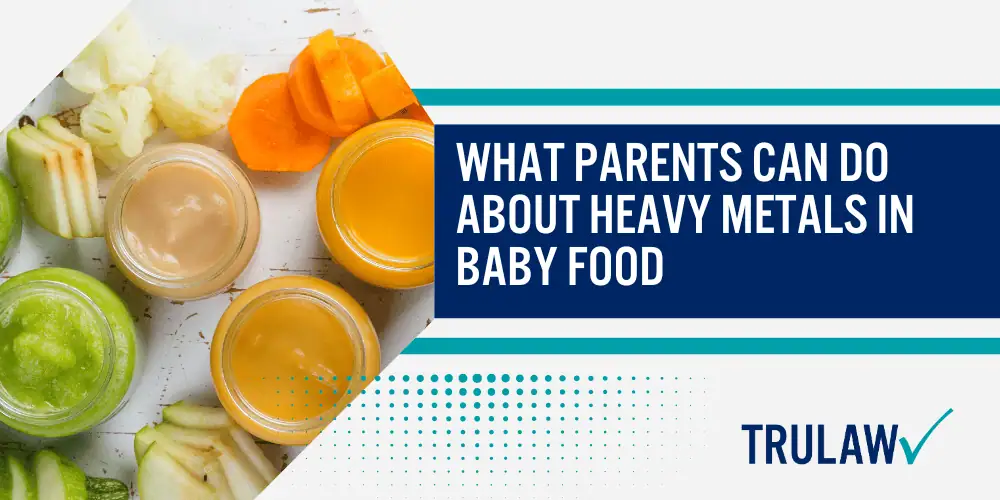
Varying the diet, choosing rice-free options, limiting juice, and offering a range of fruits and veggies are all good strategies.
Tips for Choosing Safer Baby Foods Low in Metals
While the FDA and baby food makers are taking steps to reduce heavy metals in foods, many popular products still contain these contaminants.
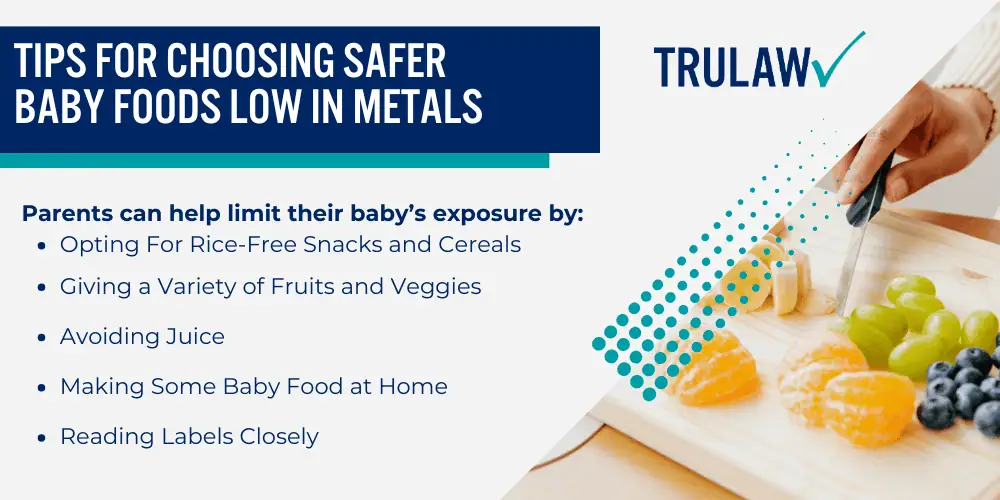
Parents can help limit their baby’s exposure by:
- Opting For Rice-Free Snacks and Cereals: Rice-based baby foods tend to have the highest inorganic arsenic content. Choose snacks and cereals made with other grains like oats, wheat, and barley.
- Giving a Variety of Fruits and Veggies: Offer many different fruits and vegetables, rather than relying heavily on carrots and sweet potatoes, which are higher in lead and cadmium. The AAP recommends a diet with a variety of nutrient-dense foods.
- Avoiding Juice: Apple, grape, and other juices contain arsenic and lead. Babies under 1 shouldn’t have any juice, according to the AAP. Limit juice to 4 ounces a day for kids 1-3.
- Making Some Baby Food at Home: Steaming and pureeing your own fresh organic fruits and veggies can limit contaminants. Vary the ingredients to minimize metals.
- Reading Labels Closely: Pay attention to ingredient lists and choose baby foods with better, simpler ingredients when possible. Support brands that are taking steps to use safer ingredients.
TruLaw: Advocates for Families Harmed by Toxic Food
TruLaw is committed to holding baby food manufacturers accountable for failing to reduce toxic metals and disclose contamination risks to parents.
Our firm has the experience and resources needed to take on this important litigation.
How TruLaw Helps Those Impacted by Heavy Metals
If you suspect your child’s neurodevelopmental issues may be connected to heavy metal exposure from contaminated baby foods, TruLaw is here to help.
Our attorneys are investigating cases on behalf of parents whose children regularly ate baby foods high in heavy metals and developed autism, ADHD, learning disabilities, and other issues.
Contact TruLaw for Help with a Baby Food Case
If toxic metals in baby food have impacted your family, contact us today for a free consultation.
You may qualify for compensation for your child’s medical expenses, care needs, pain and suffering, and other damages.
There are no upfront costs to work with us.
Our attorneys only collect a fee if we successfully resolve your claim.
TruLaw works on a contingency basis, so you pay nothing unless we win results for you.
Contact TruLaw using the chat on this page to receive an instant case evaluation and determine if you qualify to join others in filing a toxic baby food lawsuit today.
Toxic Baby Food Lawsuit Frequently Asked Questions
-
Does store-bought baby food have heavy metals in it?
Many store-bought baby foods have been found to contain high levels of toxic heavy metals, such as arsenic, lead, cadmium, and mercury.
Rice-based foods, including infant rice cereal, brown rice, sushi rice, rice puffs, and rice cakes, are especially high in inorganic arsenic.
-
Do organic baby foods contain less heavy metals?
Organic baby foods have similar levels of heavy metals compared to conventional products.
Heavy metals occur naturally in soil and can also come from pollution, so organic crops absorb these contaminants just like non-organic ingredients.
Choosing organic baby food doesn’t necessarily reduce heavy metal risks.
-
What are the health risks of heavy metals for babies?
Heavy metals in baby food can cause permanent loss of IQ, developmental delays, and behavioral issues in children.
Regularly consuming even low levels of arsenic, lead, cadmium, and mercury over time increases risks of cancer, immune, kidney, and liver disorders, and fertility issues later in life.
-
How can I reduce my baby's exposure to heavy metals from foods?
Limit rice-based foods like infant rice cereal, rice cakes, and rice-based teething biscuits, which tend to be highest in arsenic.
Avoid fruit juices, or limit to 4 ounces per day.
Offer a variety of fruits and vegetables, not just carrots and sweet potatoes, which are higher in lead and cadmium.
Make some baby food at home, using organic ingredients and varying them to minimize metals.
-
Are there any safe alternatives to rice-based baby foods?
Safer alternatives to crisped rice cereal or rice-based baby foods include oatmeal, barley, and multi-grain cereals.
Choose rice-free baby snacks and teething biscuits made from other grains.
On average, rice-free packaged snacks are 93% lower in toxic heavy metals than infant rice cereal.

Managing Attorney & Owner
With over 25 years of legal experience, Jessica Paluch-Hoerman is an Illinois lawyer, a CPA, and a mother of three. She spent the first decade of her career working as an international tax attorney at Deloitte.
In 2009, Jessie co-founded her own law firm with her husband – which has scaled to over 30 employees since its conception.
In 2016, Jessie founded TruLaw, which allows her to collaborate with attorneys and legal experts across the United States on a daily basis. This hypervaluable network of experts is what enables her to share the most reliable, accurate, and up-to-date legal information with our readers!
Additional Toxic Baby Food Lawsuit resources on our website:
Here, at TruLaw, we’re committed to helping victims get the justice they deserve.
Alongside our partner law firms, we have successfully collected over $3 Billion in verdicts and settlements on behalf of injured individuals.
Would you like our help?
At TruLaw, we fiercely combat corporations that endanger individuals’ well-being. If you’ve suffered injuries and believe these well-funded entities should be held accountable, we’re here for you.
With TruLaw, you gain access to successful and seasoned lawyers who maximize your chances of success. Our lawyers invest in you—they do not receive a dime until your lawsuit reaches a successful resolution!
AFFF Lawsuit claims are being filed against manufacturers of aqueous film-forming foam (AFFF), commonly used in firefighting.
Claims allege that companies such as 3M, DuPont, and Tyco Fire Products failed to adequately warn users about the potential dangers of AFFF exposure — including increased risks of various cancers and diseases.
Depo Provera Lawsuit claims are being filed by individuals who allege they developed meningioma (a type of brain tumor) after receiving Depo-Provera birth control injections.
A 2024 study found that women using Depo-Provera for at least 1 year are five times more likely to develop meningioma brain tumors compared to those not using the drug.
Suboxone Tooth Decay Lawsuit claims are being filed against Indivior, the manufacturer of Suboxone, a medication used to treat opioid addiction.
Claims allege that Indivior failed to adequately warn users about the potential dangers of severe tooth decay and dental injuries associated with Suboxone’s sublingual film version.
Social Media Harm Lawsuits are being filed against social media companies for allegedly causing mental health issues in children and teens.
Claims allege that companies like Meta, Google, ByteDance, and Snap designed addictive platforms that led to anxiety, depression, and other mental health issues without adequately warning users or parents.
Transvaginal Mesh Lawsuits are being filed against manufacturers of transvaginal mesh products used to treat pelvic organ prolapse (POP) and stress urinary incontinence (SUI).
Claims allege that companies like Ethicon, C.R. Bard, and Boston Scientific failed to adequately warn about potential dangers — including erosion, pain, and infection.
Bair Hugger Warming Blanket Lawsuits involve claims against 3M — alleging their surgical warming blankets caused severe infections and complications (particularly in hip and knee replacement surgeries).
Plaintiffs claim 3M failed to warn about potential risks — despite knowing about increased risk of deep joint infections since 2011.
Baby Formula NEC Lawsuit claims are being filed against manufacturers of cow’s milk-based baby formula products.
Claims allege that companies like Abbott Laboratories (Similac) and Mead Johnson & Company (Enfamil) failed to warn about the increased risk of necrotizing enterocolitis (NEC) in premature infants.
Here, at TruLaw, we’re committed to helping victims get the justice they deserve.
Alongside our partner law firms, we have successfully collected over $3 Billion in verdicts and settlements on behalf of injured individuals.
Would you like our help?
